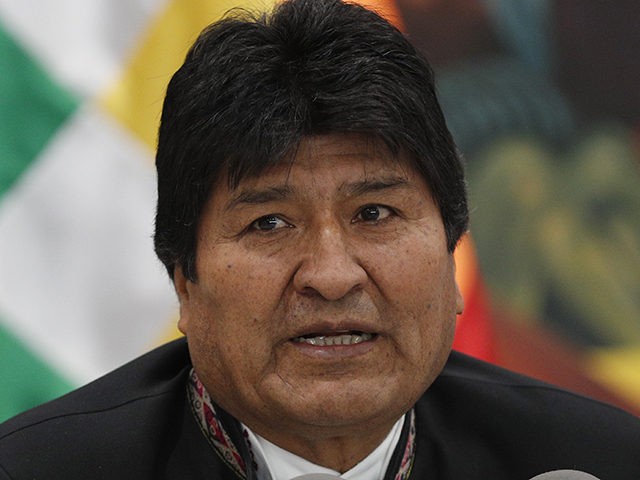Former Bolivian President Evo Morales threatened to form armed terrorist groups on Monday to take back control of his country from the constitutionally legitimate government that took over following his resignation last year.
Morales, who led Bolivia since 2006, resigned last November after an independent audit by the Organization of American States (OAS) found significant evidence that his government committed fraud to win the October presidential race. Morales was not constitutionally allowed on the ballot but pushed through a court decision declaring he had “human rights” to run for president again despite term limits.
After fleeing the country to Mexico for alleged fear for his safety, he eventually received asylum in Argentina where he is currently living to avoid arrest. He has repeatedly made clear his intention to wrestle back control of Bolivia from President Jeanine Áñez, who is leading an interim government until elections are held in May.
“In a short time, I don’t know if I’d go back or somebody goes back, we have to organize, like in Venezuela, people’s armed militias,” Morales said on Sunday in an interview with Radio Kawsachun Coca. Venezuela has a number of armed militias loyal to Nicolás Maduro who travel around cities and particularly poor neighborhoods terrorizing people into showing loyalty to the socialist regime.
Posting on Twitter Monday, Morales also pledged to “take back democracy” in Bolivia.
“I mark two months far from my beloved homeland. We arrived in Mexico shattered, however today we have the strength to return to Bolivia,” he wrote. “That resilience comes from the people, the Wiphala and the pollera,” he said. “We will struggle against racism and discrimination, and we will take back democracy.”
The Wiphala is one of two official flags of the Plurinational Republic of Bolivia, representing its dozens of indigenous communities. The pollera is a traditional indigenous skirt.
Cumplo dos meses lejos de mi Patria querida. Llegamos a #México destrozados, sin embargo hoy estamos con fuerza para retornar a #Bolivia. Esa fortaleza viene del pueblo, de la whipala y la pollera. Lucharemos contra el racismo y discriminación, y recuperaremos la democracia. pic.twitter.com/1r7gIKiNJO
— Evo Morales Ayma (@evoespueblo) January 12, 2020
In a separate interview with the left-wing propaganda outlet TeleSur, Morales claimed he would rather be a prisoner in Bolivia than create difficulties for the Argentinian government, whom he claims is being blackmailed by the United States.
“Most of all I want to be in Bolivia,” he said. “At first I thought Mexico was a good option, but I do not want to create problems for any country, so I thought maybe I would rather be a prisoner in Bolivia than harming another country.”
Morales’s remarks were strongly condemned by politicians across Bolivia. Government minister Israel Alanoca told the ABI News Agency, “It is regrettable once again to hear this man talk about confrontation and we can clearly see more signs and evidence of sedition of wanting to sow here in Bolivia.”
Carlos Mesa, a former president who faced off against Morales in last year’s presidential elections, also hit back at Morales, reminding his followers how he previously called on his supporters to block the passage of food and other essential amenities to starve out civilians and create a state of chaos around the country in order to undermine the new government.
“First he wanted to encircle the cities and now he is suggesting putting together irregular and violent groups to confront the Bolivians and the armed forces,” Mesa wrote on Twitter. “These recurring threats show the true intentions of Evo Morales.”
Primero quiso cercar las ciudades y ahora sugiere armar grupos irregulares y violentos para enfrentar a los bolivianos y a las FFAA. Estas amenazas recurrentes muestran las verdaderas intenciones de @evoespueblo
— Carlos D. Mesa Gisbert (@carlosdmesag) January 12, 2020
In audio footage released by the interim government last year, a male voice the government identified as Morales is heard telling cocoa farmers, “don’t let food into the cities.” President Añéz has since filed a case against Morales with the International Criminal Court in The Hague for “crimes against humanity.”
“Brothers, don’t let food into the cities, we will really blockade,” he can be heard saying. “When they expelled me from Congress in 2002, they did a blockade. And now, they kick me out of Bolivia; there is a blockade. We will win.”
Follow Ben Kew on Facebook, on Twitter at @ben_kew, or email him at bkew@breitbart.com.

COMMENTS
Please let us know if you're having issues with commenting.